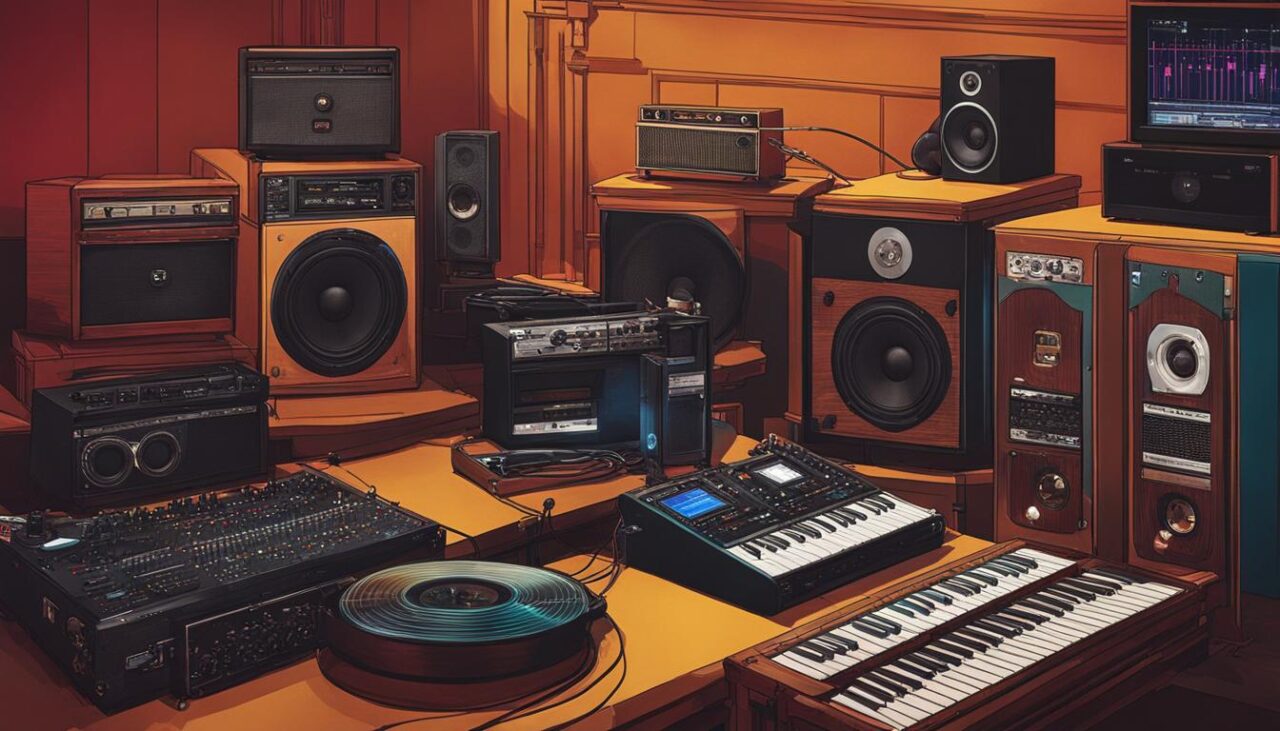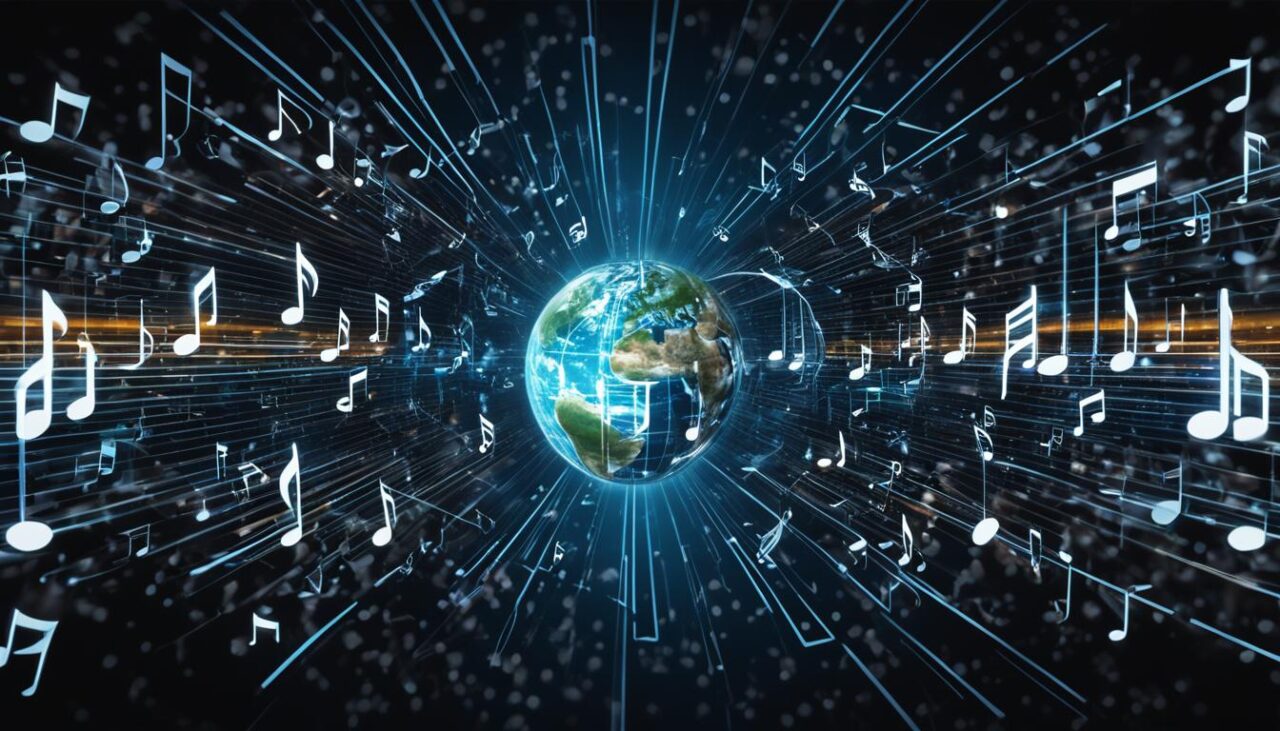Music technology has come a long way since the first phonograph was invented in the late 1800s. From vinyl records to CDs, and now digital streaming, music has evolved with technology, and vice versa. Music and technology are intricately intertwined, with one driving the evolution of the other. As we look ahead to the future, it's clear that technology will continue to play a significant role in shaping the direction of music.
The relationship between music and technology has been a continuous process of evolution. New technological advances have not only improved the way we create and consume music but also has changed the very nature of music itself. With the advent of new technologies, the possibilities are endless, and the future of music is exciting. In this article, we will explore the symbiotic relationship between music and technology, tracing the evolution of music and technology, and looking ahead to the future of music.
In the following sections, we will examine how technology has influenced music trends and different genres, as well as the global impact of music technology. We will also delve into the psychological and cultural impact of music in the digital age and the challenges and opportunities technology presents for the music industry. Finally, we will summarize how technology will continue to shape the future of music as we know it.
- 1 Exploring Music Trends Through Technological Advances
- 2 Tracing the History of Music and Technology
- 3 The Fusion of Music and Technology in Different Genres
- 4 The Global Impact of Music and Technology
- 5 The Psychology and Culture of Music in a Digital Age
- 6 The Business of Music in the Digital Era
- 7 Conclusion
Exploring Music Trends Through Technological Advances
The relationship between music and technology has always been symbiotic, with technological advancements shaping the way we create, produce, and consume music. In recent years, technology has had a massive impact on music trends, transforming the industry in profound ways.
Music streaming services like Spotify and Apple Music have revolutionized the way people consume music, offering access to millions of songs at the click of a button. Social media platforms like TikTok and Instagram have also played a significant role in shaping music trends, with viral songs and dance challenges spreading like wildfire.
Advancements in music production software have also democratized the music creation process, allowing aspiring musicians to create professional-sounding tracks from the comfort of their own homes. This has led to a proliferation of new music genres and sub-genres, with artists pushing the boundaries of what is possible with technology.
However, technological advancements have also presented challenges for the music industry, with piracy and illegal downloading posing a significant threat to musicians and record labels. Despite this, the music industry has shown remarkable resilience, adapting to the changing landscape and finding new ways to monetize music in the digital age.
“The music industry will continue to evolve as new technologies emerge, but one thing is clear: technology will continue to play a central role in shaping music trends and pushing the limits of what is possible.”
The Impact on Live Music
The impact of technology on live music has been immense, with lighting, sound, and visual effects all pushing the limits of what is possible in a live setting. Artists are now able to create immersive, multimedia experiences that engage audiences like never before, blurring the lines between music and other art forms.
Technology has also made it easier for artists to reach global audiences, with live streaming platforms like Twitch and YouTube allowing musicians to perform to fans all around the world from the comfort of their own homes. The COVID-19 pandemic has accelerated this trend, with many artists turning to live streaming as a way to connect with fans and generate revenue during lockdowns.
The Future of Music Trends
As technology continues to evolve at a rapid pace, it is clear that music trends will continue to be shaped by these advancements. Artificial intelligence and machine learning are already playing a growing role in music creation and recommendation, with platforms like Amper Music using AI to create custom music tracks for videos and other content.
Virtual and augmented reality are also poised to revolutionize the way we experience music, offering immersive, interactive experiences that blur the lines between reality and fantasy. The possibilities are endless, and the future of music trends is limited only by our imagination.
Tracing the History of Music and Technology
The relationship between music and technology dates back centuries, with each new innovation opening up new possibilities for creating, capturing, and sharing music. One of the earliest examples of music technology can be traced back to the invention of the phonograph in 1887 by Thomas Edison. This groundbreaking device allowed music to be recorded and played back for the first time, revolutionizing the way people consumed and experienced music.
In the decades that followed, various technological innovations continued to shape the way music was created and shared. From the introduction of the gramophone in the early 1900s to the development of magnetic tape recording in the 1940s, these inventions transformed the music industry and paved the way for modern music technology.

In the 1960s and 70s, the emergence of electronic music marked a new chapter in the history of music technology. Pioneers like Robert Moog and Don Buchla developed synthesizers and other electronic instruments that allowed musicians to create entirely new sounds and sonic landscapes.
With the advent of the digital age in the 1980s, music technology took yet another leap forward. The introduction of digital recording and editing software enabled musicians to record and manipulate music with unprecedented precision and control. The rise of the internet and digital distribution platforms like Napster in the 1990s and early 2000s further transformed the way music was created, distributed, and consumed.
“The intersection between technology and music has played a crucial role in shaping the way we experience and understand the world around us.” – Mark Katz
Today, music technology continues to evolve at a rapid pace. From artificial intelligence tools that can compose music to virtual reality platforms that provide immersive music experiences, the possibilities for music and technology are virtually endless.
The Fusion of Music and Technology in Different Genres
Technology has revolutionized the way music is created, produced, and performed. From using MIDI controllers and digital audio workstations to incorporating virtual instruments and electronic drum kits, the possibilities for integrating technology into various genres are endless.
Electronic dance music (EDM) is a prime example of a genre that has embraced technology. With the use of software such as Ableton Live and Native Instruments, DJs can create complex arrangements while performing live. The use of synths, samplers, and drum machines has also become standard in the genre.
Rock music has always been associated with the electric guitar, but technology has taken it even further. Guitar effects processors, distortion pedals, and amp simulators have become integral tools for guitarists, allowing them to achieve a wide range of sounds and tones.
Classical music has also seen the integration of technology, with the use of MIDI keyboards and notation software making it easier for composers to create and arrange orchestral pieces. The use of digital sheet music also allows performers to access and read scores on tablets or other electronic devices.
The fusion of music and technology has also led to the creation of new genres, such as chiptune and glitch, which focus on manipulating sound using technology. These genres have gained a following in the gaming and technology communities.
“Technology has allowed us to experiment and create new sounds that were not possible before. It's exciting to see how different genres have incorporated technology into their music.” – DJ and producer Armin van Buuren
As technology continues to evolve, it will be interesting to see how new genres and sounds are created. The possibilities are endless, and the fusion of music and technology will undoubtedly continue to shape the future of music.

The Global Impact of Music and Technology
As music technology continues to evolve, it has broken down barriers between cultures and countries. The result has been a thriving global music scene, with musicians and fans alike easily sharing their music and influences. From African rhythms in American jazz to Bollywood beats in pop music, music technology has made cross-cultural collaboration and influence easier than ever before.
Advancements in digital music distribution have also made it possible for fans around the world to access and consume music from virtually anywhere. With just a few clicks, fans can explore the world's musical offerings, discovering new sounds and artists they might otherwise never encounter.
Furthermore, technology has played a key role in preserving diverse musical traditions, often on the brink of disappearing. Digital recordings and archives are making it easier to document and preserve traditional music from cultures around the globe. Through efforts by UNESCO and others, digital libraries of traditional music have been created, providing a platform for sharing and celebrating cultural heritage.

The impact of music technology on globalization is undeniable. The world of music has become an interconnected web of sound, drawing on influences from every corner of the globe and bringing people together in ways that were once unimaginable.
The Psychology and Culture of Music in a Digital Age
The advent of technology has greatly impacted the way we engage with music, both psychologically and culturally. The availability of music through various technological devices and platforms has made it more accessible, leading to an increase in music consumption and the formation of new music cultures.
One area where technology has influenced music psychology is in the emotional experience of music. Digital platforms have made it easier to manipulate the sound of music, altering the emotional response that music evokes. The use of algorithms to create personalized playlists based on listening patterns has also changed the way we connect with music, shaping our musical tastes and preferences.
“Technology allows us to create and manipulate music in ways we never thought possible, changing the way we interact with and understand music as an art form.”
Furthermore, the rise of social media has enabled music enthusiasts to form new communities online, fostering a sense of belonging and shared culture. Digital technology has also impacted the way music is created, with artists using software programs and digital tools to produce and distribute their music.
However, the digital age has also posed challenges to the traditional music industry and its business model. The ease of music piracy and unauthorized sharing has impacted industry revenue, forcing record labels and distributors to adapt to a changing landscape.
In conclusion, technology has had a significant impact on the psychology and culture of music in the digital age. As technology continues to evolve, its impact on music and its listeners will continue to shape the future of the music industry and its culture.
The Business of Music in the Digital Era
Technology has revolutionized the music industry, leading to a fundamental reshaping of the way music is created, distributed, and consumed. With the advent of digital music technologies, the industry has seen a shift from physical album sales to digital downloads and streaming services.
Although the digitalization of music has opened up new opportunities for musicians and record labels, it has also presented significant challenges. The rise of file-sharing and music piracy has led to revenue loss for artists and the industry, bringing about the need for new solutions that combine music and technology to protect intellectual property rights.
Streaming services like Spotify and Apple Music have emerged as popular ways for consumers to access and discover music, offering a convenient and affordable alternative to traditional album purchases. While this has increased accessibility for listeners, it has also raised concerns about the impact of streaming on artist compensation and the overall financial sustainability of the industry.
Despite these challenges, the music business continues to evolve alongside technology, with new innovations such as blockchain-based music rights management and virtual concert experiences being developed to meet the needs and demands of the digital age.
“The music industry is in a state of constant flux, with technology playing an increasingly integral role in shaping its future.”
Conclusion
In conclusion, the symbiotic relationship between music and technology has resulted in a significant evolution of the music industry. Advancements in technology have enabled musicians to create, produce, and distribute music in ways that were unimaginable just a few decades ago. The future of music is heavily reliant on technology, and we can expect to see even more advancements in the coming years.
As the music industry continues to evolve, it is crucial that we embrace these changes and leverage technology to our advantage. Musicians and record labels must adapt to the digital era to remain relevant and competitive. Similarly, music consumers must also embrace new technologies to access and enjoy music in innovative and exciting ways.
While the role of technology in music evolution has been significant, it is essential to remember the importance of creativity and human emotion in music. Technology may enhance the music experience, but at its core, music is about emotion and expression. Therefore, as we look to the future of music, we must strive to strike a balance between technology and creativity.
Overall, the symbiotic relationship between music and technology has resulted in an exciting and dynamic industry that continues to evolve rapidly. We can be sure that the future of music will be shaped by technology, and we must embrace these changes if we hope to remain relevant and competitive in the music industry.
Contents [hide]
- 1 Exploring Music Trends Through Technological Advances
- 2 Tracing the History of Music and Technology
- 3 The Fusion of Music and Technology in Different Genres
- 4 The Global Impact of Music and Technology
- 5 The Psychology and Culture of Music in a Digital Age
- 6 The Business of Music in the Digital Era
- 7 Conclusion

